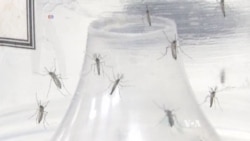A few years back, a friend asked Andrew Lima for help fighting the mosquitoes constantly biting him at his apartment in the Capitol Hill neighborhood of Washington, D.C.
What Lima found shocked him.
"Upon going in his place and seeing the first mosquito that I saw, I … found it was the Aedes aegypti mosquito," said the mosquito biologist of his 2011 visit.
Lima works with the Disease Carrying Insects Program of Fairfax County, Virginia, so he recognized the mosquito as the kind that can carry the Zika virus. Zika has been anecdotally linked to birth defects in thousands of children in Latin America.
The Aedes aegypti mosquito also carries yellow fever, which is responsible for transmitting the dengue and chikungunya viruses.
That 2011 finding was during one of Washington's hot, humid summers. Lima expected the Aedes aegypti to disappear after winter, but for five years now, Lima has been visiting the neighborhood and finding more.
"There was no new gene coming in, meaning this was a population that had existed here and was continuing to exist here somehow throughout the winter months," Lima said.
The biologist told VOA the mosquitoes found a way to survive the cold winter weather — most likely, he said, by finding shelter under bridges, in trees or in underground structures, and laying eggs in nearby puddles.
But even though Aedes aegypti is in the nation's capital, the scientist thinks there is little cause for the same alarm that is sweeping Latin America.
"A lot of that has to do with differences in the fact that we have much less open-air living here,” Lima said. “People have air conditioning, and intact screens and windows, whereas in the tropics there is much more of an outdoor component to the way that people live and work."
Those differences, he said, make it harder for any viruses the mosquito carries to take hold.
While the mosquito may not pose a great risk to residents, Lima believes it is here to stay. Warming global temperatures may be a factor in finding Aedes aegypti as far north as Washington, he said.












